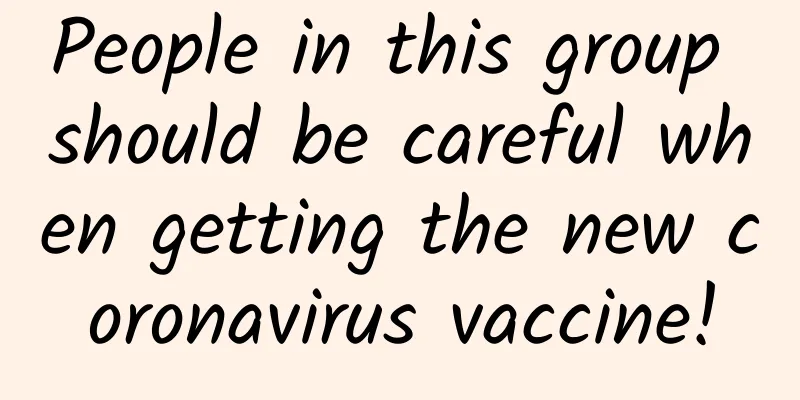People in this group should be careful when getting the new coronavirus vaccine!

|
Spring is the peak season for pollen allergies Can patients with pollen allergies get the new coronavirus vaccine? What should I pay attention to if I get vaccinated? What methods are effective in preventing pollen allergies? Let's listen to the experts' answers At the press conference of the Joint Prevention and Control Mechanism of the State Council held on April 6, Wang Huaqing, chief expert of the immunization program of the Chinese Center for Disease Control and Prevention, made it clear that spring is the peak season for pollen allergies, and a history of pollen allergies is not a contraindication to the COVID-19 vaccine. Only those who are allergic to the COVID-19 vaccine, or are allergic to the ingredients in the COVID-19 vaccine, or have had severe allergies to other vaccines in the past, are contraindicated from the COVID-19 vaccine. So Vaccination for people with pollen allergies Are there any special considerations? Wang Huaqing said that if a person who is allergic to pollen is in the acute stage of allergy, especially if the pollen allergy causes severe symptoms such as asthma, vaccination should be delayed. For those who have a history of pollen allergy and can be vaccinated, they should inform the clinician or vaccinating doctor when they are vaccinated, and they should also strictly abide by the rule of staying for observation for 30 minutes after vaccination. In most parts of my country, the spring peak from April to June and the autumn peak from August to September are the two peak seasons for pollen allergies each year. In this regard, Wang Huaqing said that when flowers bloom in spring, some people with a history of pollen allergies begin to suffer from symptoms, including itchy eyes, sneezing, coughing, and severe asthma complications. For sensitive people How to prevent pollen allergy? Experts give some practical tips If you are allergic to pollen, experts suggest that you can use some medications to relieve symptoms, but do not use them indiscriminately and avoid using topical medications containing chlorine or fluoride, especially for eye allergies. It is not recommended to buy eye drops on your own because some anti-allergic eye drops contain hormones, which may cause the risk of glaucoma. In addition, some high-protein foods, which are called "hair-inducing" foods in traditional Chinese medicine, such as fish, shrimp, seafood, beef, mutton, and peppers, are likely to stimulate a state of high sensitivity after being eaten in this season. Source: Xinhuanet Final judge: Zhang Qingshui Author: Wang Ying Editor: Lu Junyu Proofreading: Yao Runping |
>>: Five little-known facts about peony
Recommend
Data | Big data explains whether Internet car manufacturing is reliable
The video maker is going to make cars, the home a...
WeChat long press for 2 seconds has so many hidden functions. Learn more
[[321342]] According to Tencent's 2019 annual...
Today’s Rain|Misty rain in Jiangnan, night rain in Bashan, freezing rain…the “rain” in rain is not simple!
As the second solar term in spring, Rain Water ha...
WeChat has quietly updated again. Have you discovered these 6 new features?
In every recent update of WeChat, there is no spe...
Detailed explanation of the promotion and operation strategies of the loan industry!
First, let’s analyze Daichao’s business processes...
"When the phone rang, every pore of my body was screaming for help!" Do you also have a fear of telephones?
Do you panic when you hear the phone ringing? Or ...
Zhou Hongyi: 360 is too conservative in making smart hardware
[[141850]] Zhou Hongyi said that the Internet bus...
Can eating pumpkin and corn lower blood sugar? My parents have been eating them for many years, but they don’t know the inside story…
Expert of this article: Dou Pan, deputy director ...
The latest illegal marketing in Douyin live broadcast room and how to quickly attract traffic!
On July 29, Douyin introduced new regulations on ...
China App Rankings in Q2 2016: The unstoppable dark horse and the unbeatable leader!
The freshly released “2016 Q2 China App Rankings”...
In the New Year's greetings, those great weapons of the great powers that can "go to the sky, the sea and the land"
President Xi Jinping has delivered New Year's...
H1N1 flu is coming, understand these symptoms and don't panic
Review expert: Peng Guoqiu, deputy chief physicia...
The counterattack of films directed by Han Han, Guo Jingming and others: with the help of the Internet
For the 2014 summer movies, the film producers ar...
How to effectively promote WeChat Moments?
In an era when mobile social applications are all...









